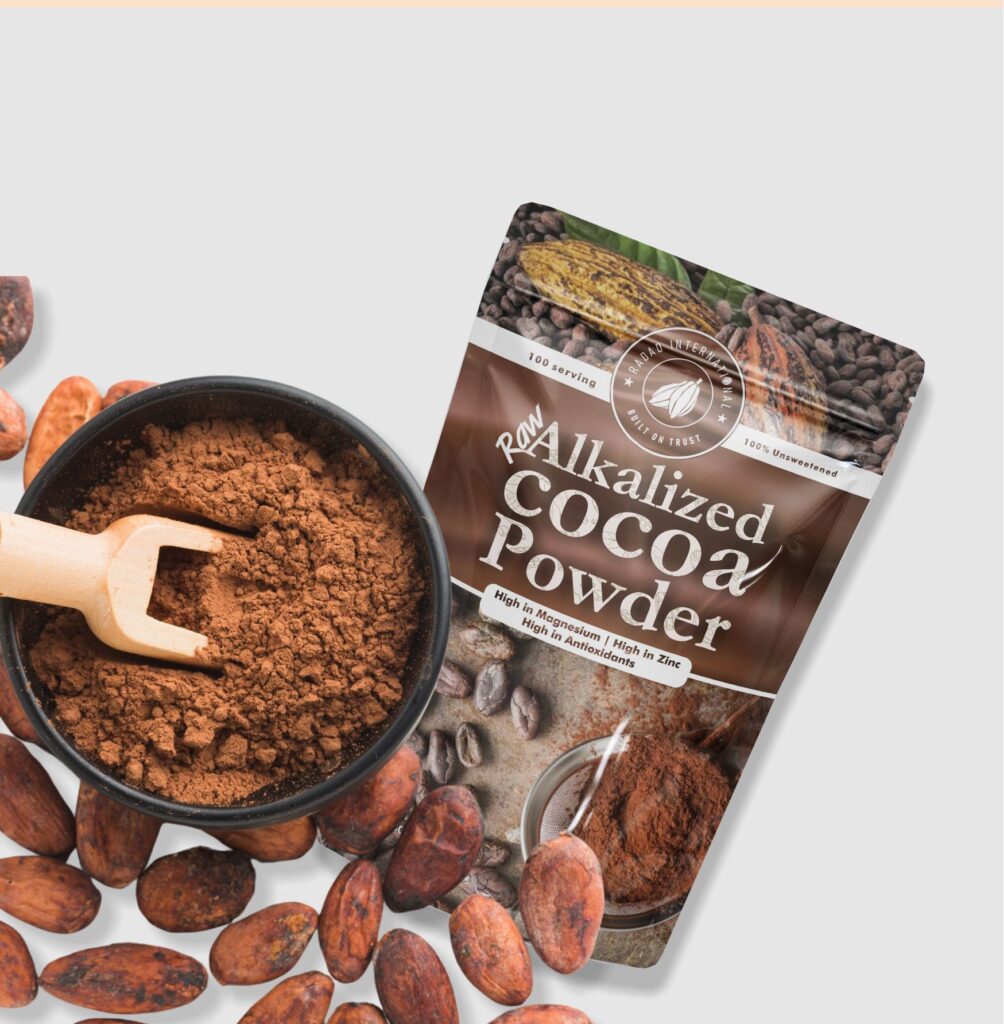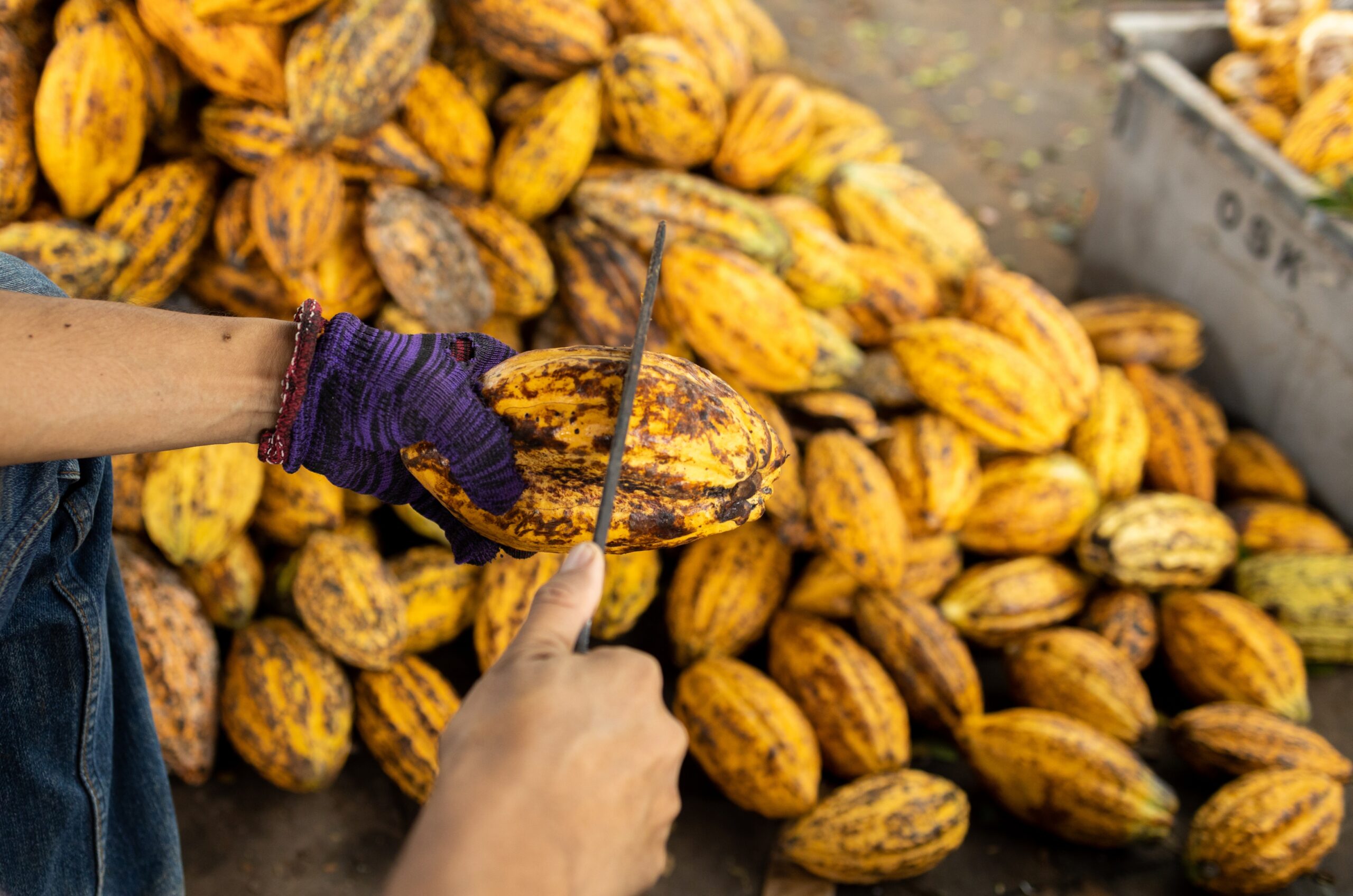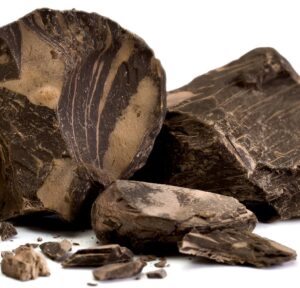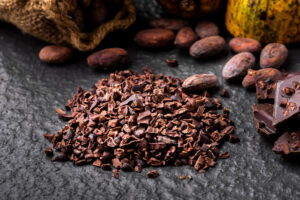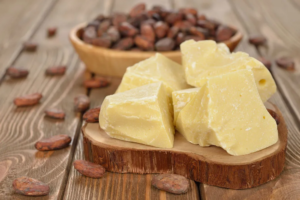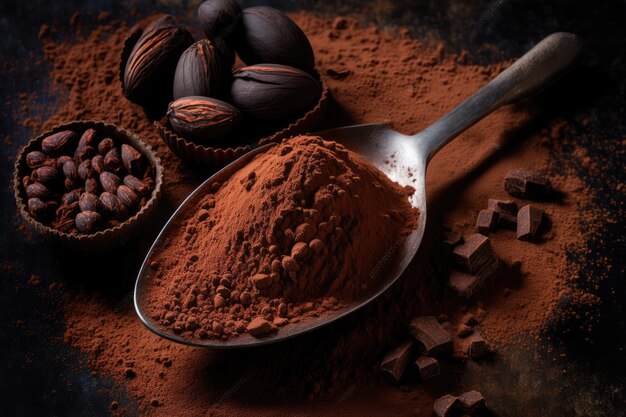
Alkalized cocoa powder — also known as Dutch-process cocoa powder — is a type of cocoa that’s been treated with an alkaline substance (usually potassium carbonate). This treatment reduces the natural acidity of cocoa and changes both its flavor and color.
Now, when you hear “alkalized,” it might sound like it’s a completely different product, but really, it’s still cocoa powder — just processed a bit differently from the natural kind.
So, how is it made?
- It starts with fermented and roasted cocoa beans.
- These beans are ground into nibs, then into a thick cocoa mass.
- During or after this step, the cocoa is treated with alkali.
- The result? A smoother, less acidic cocoa powder that’s often darker and richer in flavor.
The alkalization process changes the pH level of cocoa — from naturally acidic (pH 5–6) to more neutral or slightly alkaline (pH 7–8). And that changes everything: from how it tastes to how it behaves in baking.
That’s why it’s often used in recipes that call for a deep, mellow chocolate flavor and a rich dark color — like brownies, cakes, hot chocolate mixes, and even cosmetics.
You might also hear it referred to as:
- Dutched cocoa
- Dutch-process cocoa
- Cocoa rouge (in some professional circles)
In short, alkalized cocoa powder is still cocoa — just less tangy, more chocolatey, and a lot more versatile in certain types of recipes.
What Makes Alkalized Cocoa Powder Unique?
-
The Color – Deep, Dark, and Consistent
-
Black cocoa
-
Red Dutch cocoa
-
The Flavor – Smooth and Mellow
-
The Texture – Finer and Easier to Mix
-
Mix with liquids
-
Blend into doughs or batters
-
Use in dry baking mixes or chocolate coatings
-
The pH – Affects How You Bake
-
If a recipe uses baking soda, it likely calls for natural cocoa.
-
If it uses baking powder, it’s likely better with alkalized cocoa.
-
A deeper color
-
A smoother, less bitter taste
-
Easier mixability
-
A different baking behavior than natural cocoa
How Alkalized Cocoa Powder Is Used Across Industries
-
Food Manufacturing & Bakeries
-
Chocolate cakes, muffins, and brownies
-
Dry baking mixes
-
Frostings and fillings
-
Pancake mixes
-
Instant puddings
-
Protein bars and energy snacks
-
Beverage Industry
-
It’s smoother and doesn’t clump
-
It has a less bitter, more creamy flavor
-
It looks darker and more chocolatey
-
Ice Cream and Dairy Products
-
Premium chocolate ice creams
-
Gelato
-
Chocolate yogurts
-
Chocolate dairy desserts
-
Cosmetics and Personal Care
-
Natural face masks
-
Body scrubs
-
Lip balms and moisturizers
-
Soaps and creams
-
Confectionery & Chocolates
-
Coatings for candy bars
-
Cocoa-dusted truffles
-
Chocolate wafers
-
Pre-mixed fillings
-
Chocolate spreads
-
Baking and packaged food mixes
-
Hot and cold drinks
-
Ice cream and dairy
-
Natural cosmetics
-
Chocolate coatings and fillings
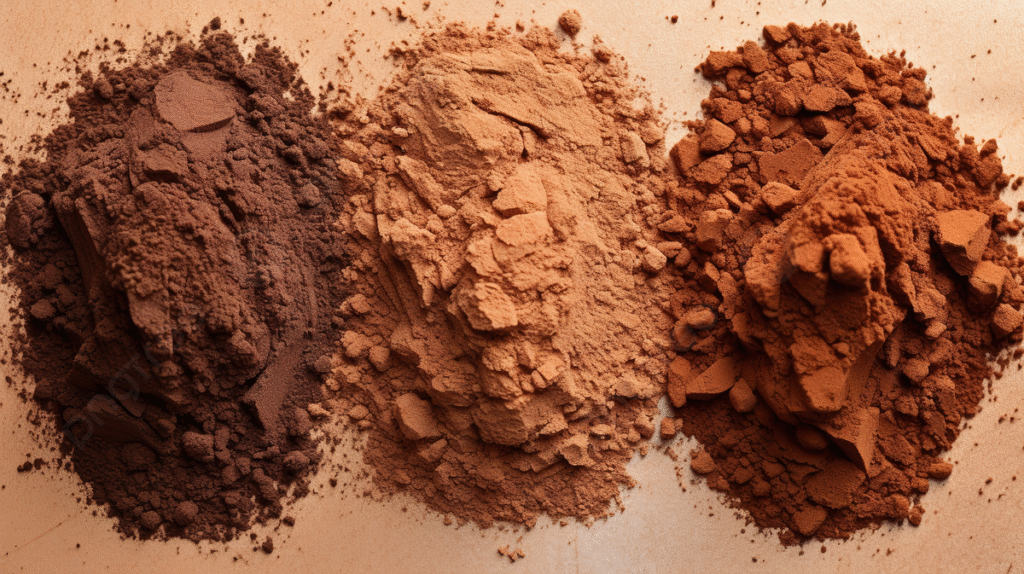
Where to Buy Alkalized Cocoa Powder in Bulk — Especially in the UAE
-
Bulk vs. Retail — Know What You Need
-
Do I need retail packs (1–5kg for small production or reselling)?
-
Or do I need industrial-size orders (20kg+, up to container loads)?
-
Top Suppliers in the UAE
-
Cargill Cocoa Powder: Known worldwide for consistency and supply chain scale. Their Gerkens cocoa line is especially popular in the UAE for food production, baking, and beverages. Available in both natural and alkalized versions. Gerkens is a trusted name for dark brown cocoa powder that works well in desserts and drinks.
-
Radad International: A UAE-based company (with sourcing roots in Nigeria, Ghana, Ivory Coast … etc.) that focuses on bulk cocoa products — including alkalized cocoa powder, cocoa mass, and cocoa nibs, cocoa butter. What makes them appealing is that they tailor quantities to the buyer’s scale — so whether you’re a growing bakery or an established chocolate brand, they’ll adjust to your needs.
-
Al Adil Trading and Spinneys Foodservice: For smaller-scale sourcing, some local UAE distributors carry reliable foodservice-grade cocoa powders.
-
What to Look For in a Supplier
-
Certifications: Look for Halal, ISO, HACCP, or Organic if your product requires it.
-
Consistent Color and Fat Content: Some buyers need 10–12% fat content, while others may need low-fat versions. Ask to confirm this upfront.
-
Packaging: Cocoa needs to be protected from heat and moisture — check if packaging is moisture-proof and food-grade.
-
Shipping & Storage Conditions: Cocoa powder can absorb odors and spoil in the heat. Make sure your supplier stores and ships in climate-controlled conditions.
-
Pricing & Market Trends
-
Plan ahead: Avoid buying last minute.
-
Compare offers: Some sellers offer CIF prices (including freight), while others sell ex-warehouse (you handle logistics).
-
Negotiate long-term: If your volumes are consistent, secure a stable price contract.
-
UAE Import & Logistics Advantage
-
Dubai Industrial City
-
KIZAD (Abu Dhabi)
-
Sharjah Industrial Area This keeps lead times short for local businesses
Frequently Asked Questions (FAQs)
❓ What is alkalized cocoa powder?
❓How is alkalized cocoa powder different from natural cocoa powder?
-
Natural cocoa powder is more acidic and has a sharper, fruity flavor.
-
Alkalized cocoa powder is neutral or slightly alkaline, with a richer, less bitter taste and deeper color.
❓What is alkalized cocoa powder used for?
-
Baking (cakes, cookies, brownies)
-
Chocolate drinks and hot cocoa
-
Ice cream and desserts
-
Confectionery and chocolate coatings
-
Health supplements and protein powders
-
Cosmetic products (as a natural coloring or scent)
❓Is there alcohol in alkalized cocoa powder (aka cocoa liquor)?
❓What brands offer high-quality alkalized cocoa powder?
-
Cargill Cocoa & Chocolate, especially their Gerkens® line (very popular in the UAE market)
-
Barry Callebaut
-
ADM Cocoa
-
Radad International (bulk African-origin cocoa mass & powder supplier in the UAE, GCC, Middle East, Europe and world wide)
❓Is brown cocoa powder the same as alkalized cocoa powder?
❓Is alkalized cocoa powder safe to eat?
❓Is alkalized cocoa powder halal certified?
❓What’s the fat content in alkalized cocoa powder?
-
10-12% cocoa butter (low-fat) – common in baking and drinks
-
20-22% cocoa butter (high-fat) – used for richer, smoother textures in gourmet chocolate and desserts
❓Where can I buy alkalized cocoa powder in bulk in the UAE?
-
Local distributors in Dubai Industrial City, Jebel Ali, Sharjah, or Abu Dhabi (KIZAD)
-
Direct importers like Radad International, who supply African-origin cocoa products across Dubai and the GCC
-
International brands (like Cargill, Gerkens, or Callebaut) via their regional representatives
❓What’s the typical pH level of alkalized cocoa powder?
❓How does alkalized cocoa powder behave in baking?
❓What’s the difference between light, medium, and dark alkalized cocoa?
| Type | pH Range | Color | Flavor |
| Light Dutch | 6.8–7.2 | Light brown | Slightly mellow |
| Medium Dutch | 7.2–7.6 | Reddish brown | Balanced, smoother |
| Dark Dutch | 7.6–8.1 | Deep brown/black | Very mild, earthy |
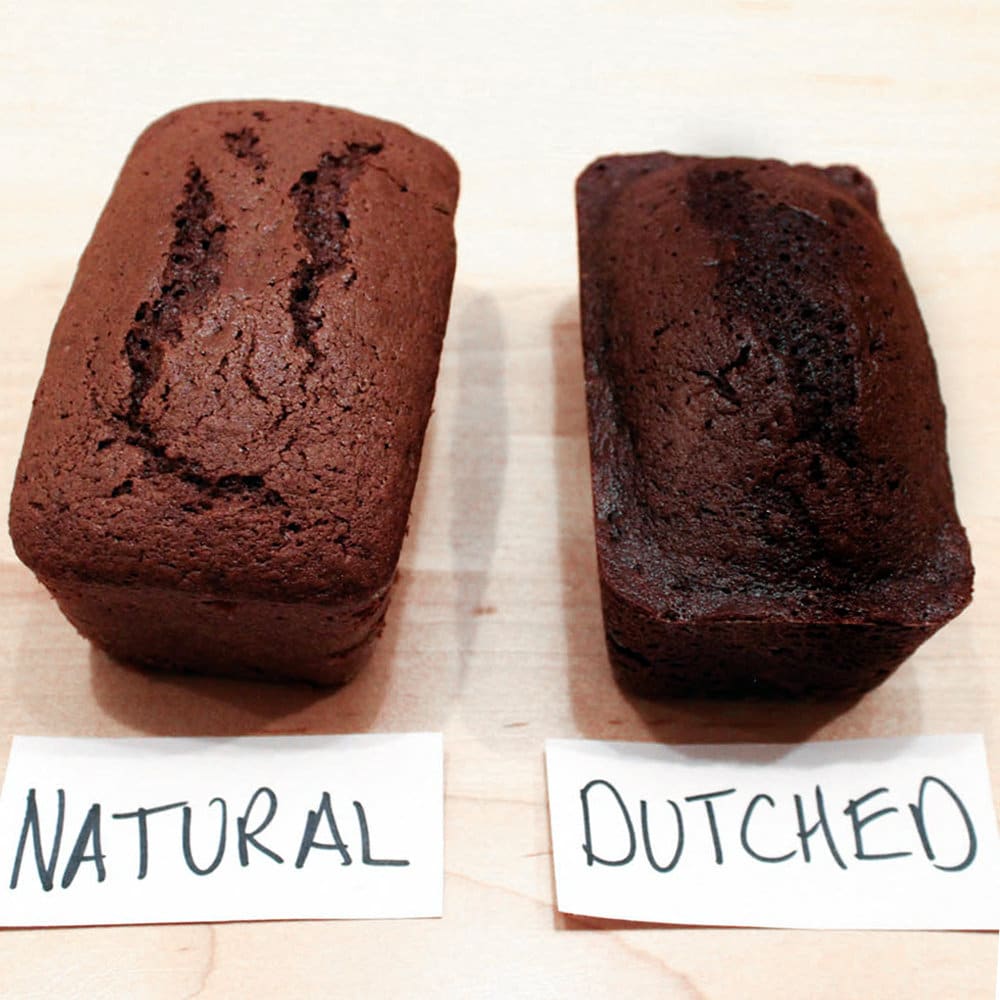
❓What’s the shelf life of alkalized cocoa powder?
❓Is alkalized cocoa powder more soluble than natural cocoa powder?
❓Is there any difference in nutritional value between alkalized and natural cocoa?
❓Does alkalized cocoa contain sugar?
❓Can alkalized cocoa powder be used in cosmetics or skincare?
❓Is it safe to consume alkalized cocoa daily?
❓How should alkalized cocoa powder be stored, especially in hot climates like the UAE?
-
Temperature: Below 25°C (preferably air-conditioned warehouse)
-
Humidity: Below 60%
-
Packaging: Keep it sealed in original bags or airtight containers
-
Avoid strong odors: Cocoa absorbs smells easily

